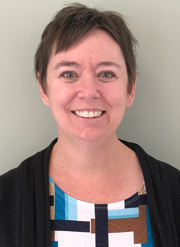SRU faculty-led programs give students a taste of study abroad

Twelve Slippery Rock University students will travel to the Central American country of Belize, Jan. 3-14, where they will visit an ancient Mayan village, as part of SRU’s faculty-led study abroad programs. An additional 18 groups, ranging from 15-40 students each, will be taking trips to countries such as Greece, Spain, Costa Rica and Mexico during spring break, March 11-18.
Nov. 15, 2017
SLIPPERY ROCK, Pa. - Faculty-led study abroad programs offer students at Slippery Rock University the opportunity to whet their appetite for enhanced academic pursuits and international travel, without committing an entire semester or year in another country.
"Faculty-led programs are a way for our students to experience another country and culture through a group experience," said Jenny Kawata, SRU director of global exchanges and partnerships. "They are a short, quick introduction to that culture, and we're hoping they provide development and growth in understanding other cultures and meeting curricular goals as well."
During the University's March 11-18 spring break, 18 groups, ranging from 15-40 students each, will travel to countries including Greece, Spain, Costa Rica and Mexico.
Slots remain open for those interested, although time is running short with a Nov. 17 application deadline looming. Students can view a list of programs and access an application online, but are encouraged to visit the Office for Global Engagement located in Spotts World Culture Building, Room 002 if they are interested in enrolling.

KAWATA
Between 300-400 SRU students travel abroad in faculty-led programs each year, including trips planned for winter break, spring break and pre-summer session. Some programs require students to be enrolled in a specific class, such as the group of 20 School of Business students who are traveling to Italy as part of a 300-level Retail Management course; while others give first preference to students who have taken certain classes or are majoring in a program, such as 16 psychology majors who are going to England.
While many of the programs have different learning outcomes and experiences for students, the theme for all the programs is creating connections.
"It's a unique way of connecting," Kawata said. "These programs not only foster relationships between the University and other countries but also create connections between students and faculty members, who may not be in their department, and with other students who they might not be taking classes with."
A perfect example of this is a faculty-led program for the upcoming winter break led Becky Thomas and Betsy Kemeny, assistant professors of parks, conservation and recreational therapy. Thomas and Kemeny are taking a group of 12 students to the Central American country of Belize, Jan. 3-14. Although the entire traveling party is from the same department, parks and conservation majors and recreational therapy majors are from two separate programs that don't often collaborate or take the same courses.
The Belize group will literally and figuratively cover a lot of ground during the 11 days abroad, where they will visit a Mayan village and observe how plants are used in a healing ceremony, conduct trail maintenance at a baboon sanctuary run by a women's group, talk to a local farmer named Daniel who uses sustainable farming practices such as agro-forestry and analyze how adults with disabilities are treated in the Belizean culture.
"We're taking a ridges-to-reef approach, so we are starting in the rainforest and we'll make our way out to the Mesoamerican Barrier Reef," Thomas said. "The purpose of the trip is to help our students see connections between parks and conservation and recreational therapy. We're going to be focusing on the concept of One Health, a movement that aims to understand how ecosystem health, wildlife health and human health are interconnected."
Examples of this interconnectedness is how infectious diseases are spread because of climate change and wildlife patterns, as well as ecotourism and identifying sustainable ways that humans can experience nature with a low-impact on the environment.
Although enrollment for the winter break Belize trip is closed and openings for the spring break trips close Nov. 17, Kawata says it's never too early for students to consider future study abroad programs.
"Faculty-led programs are a nice first step for students who may have never traveled abroad and they may eventually decide to study abroad in a more individually driven program," Kawata added.
Because SRU helps subsidize its study-abroad programs, they are more affordable than most students realize. A typical weeklong faculty-led program costs students between $1,875-$2,000 and includes transportation, housing and some meals.
For more information, contact the Office for Global Engagement at 724.738.2057.
MEDIA CONTACT: Justin Zackal | 724.738.4854 | justin.zackal@sru.edu

